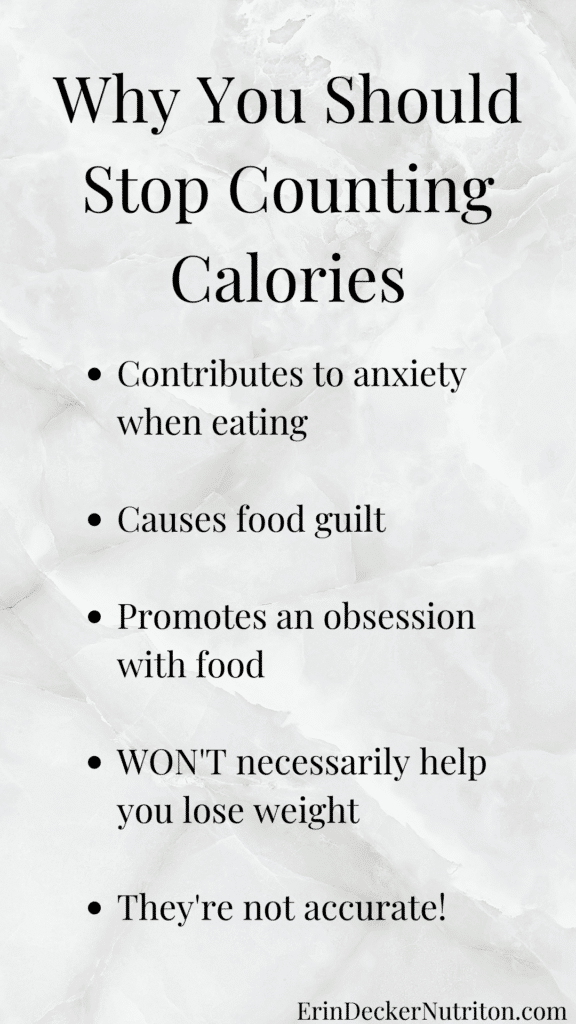Calories in, calories out. That has been the standard advice, and it may work for a while. It can be tempting to go back to it when you are stuck in the dieting cycle. But there are a few reasons you should stop counting calories.
Counting calories contributes to anxiety when eating
Restricting calories means you are always paying attention to what you are eating and how it will affect your tally for the day. It can make it difficult to tune into hunger and fullness cues and honor your true preferences.
For many, this can lead to anxiety, especially if they need to stray from their typical eating pattern. It can be challenging when you are forced to eat something that is difficult to log or are out to eat and everything on the menu would put you over your target.
In addition, restricting calories when you are hungry contributes to existing anxiety by starving your brain of needed nutrients. A hungry brain is an anxious brain!
Counting calories can lead to food guilt
Aiming for a calorie target can make it easy to fall into negative self-talk when you don’t make your goal. It can contribute to all-or-nothing thinking, such as “I’ve already exceeded my target, might as well finish my plate.”
Calorie counting is a rigid behavior that does not allow for flexibility and nuance in your daily eating behaviors. As a result, many may find themselves feeling guilty after eating.
Counting calories contributes to food obsession
Most people will find themselves thinking about food constantly when tracking calories. Sometimes food journaling can be helpful and provide valuable insight, but generally it means your focus is on food all day long. This can take up valuable brain space and contribute to food obsession.
Counting calories won’t necessarily help you lose weight
It’s true! Counting calories doesn’t always work. Even before embracing the anti-diet work, I worked with several clients following low calorie diets who did not lose weight.
The “eat less, move more” concept makes sense in theory, but weight science is much more complex. Even when someone does everything “right” their body may remain at its biological set point.
Calories are not accurate
How many calories are in an apple? Google says 95. But what type of apple? How big is the apple? How much of the apple do you eat? Are you eating it whole or blending it? There is a lot of room for error here.
How are calories even calculated to begin with? It’s not that simple! Historically, calories were calculated using a method known as food calorimetry. A calorie (technically a kilocalorie) is a unit of energy, specifically the amount of energy needed to raise the temperature of 1 liter of water by 1 degree celsius. In order to calculate the energy, or calories, in a food product, it was placed in a “calorimeter” and burned. The energy released is then used to heat a standard amount of water. The temperature change is then used to calculate the amount of calories in food.
Today, most manufacturers calculate calories based on their quantity of carbohydrate, protein, and fat. It is generally accepted that each gram of carbohydrate, protein and fat provides 4, 4, and 9 calories per gram, respectively. Legally, manufacturers are allowed a 20% margin of error on their calorie counts.
This calculation gives us a good starting point to identify how many calories are in a food item. However, it doesn’t take into account food preparation and individual variations in food digestion and metabolism.
For example, cooking and blending tend to break down fibers making the foods more easily digested, likely affecting the calorie absorption in the body. Your gut microbiome may have an impact on how many calories you absorb from a given food as well.
Bottom line? Calculating how many calories you are consuming is a rough estimate at best.

Try Intuitive Eating Instead
So if you shouldn’t count calories, what should you do instead?
Try intuitive eating! Intuitive eating is a truly holistic approach to eating that allows you to connect with your internal hunger and fullness cues. It encourages you to tune into why you are eating and respond to your emotions in a compassionate manner. Intuitive eating supports a healthy body image and self esteem.

I can certainly see why one would want to cut down on counting calories. As you mentioned here, it can be stressful, not to mention potentially inaccurate if data isn’t properly accounted for. This is some good insight to know.